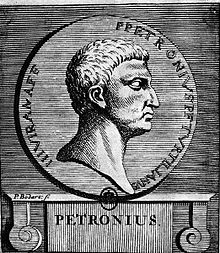 Gaius Petronius Arbiter[citation needed] (/pɪˈtroʊniəs/; c. 27 – 66 AD) was a Roman courtier during the reign of Nero. He is generally believed to be the author of the Satyricon, a satirical novel believed to have been written during the Neronian era (54-68 AD).
Gaius Petronius Arbiter[citation needed] (/pɪˈtroʊniəs/; c. 27 – 66 AD) was a Roman courtier during the reign of Nero. He is generally believed to be the author of the Satyricon, a satirical novel believed to have been written during the Neronian era (54-68 AD).Life[edit]
Tacitus, Plutarch and Pliny the Elder describe Petronius as the elegantiae arbiter (also phrased arbiter elegantiarum), "judge of elegance" in the court of the emperor Nero. He served as suffect consul in 62.[1] Later, he became a member of the senatorial class who devoted themselves to a life of pleasure. His relationship to Nero was apparently akin to that of a fashion advisor.
None of the ancient sources give any further detail about his life, or mention that he was a writer. However, a medieval manuscript written around 1450 of the Satyricon credited a "Titus Petronius" as the author of the original work. Traditionally, this reference is linked with Petronius Arbiter, since the novel appears to have been written or at least set during his lifetime. The link, however, remains speculative and disputed.
As a writer[edit]
Petronius' development of his characters in the Satyricon, namely Trimalchio, transcends the traditional style of writing of ancient literature. In the literature written during Petronius' lifetime, the emphasis was always on the typical considerations of plot, which had been laid down by classical rules.[citation needed] The character, which was hardly known in ancient literature, was secondary. Petronius goes beyond these literary limitations in his exact portrayals of detailed speech, behavior, surroundings, and appearance of the characters.
Another literary device Petronius employs in his novel is a collection of specific allusions. The allusions to certain people and events are evidence that the Satyricon was written during Nero's time. These also suggest that it was aimed at a contemporary audience which consisted in part of Nero's courtiers and even Nero himself.
One such allusion, found in chapter 9, refers to the story of the good wife Lucretia which was well-known at the time:
The message Petronius tries to convey in his work is far from moral and does not intend to produce reform, but is written above all to entertain and should be considered artistically. Nevertheless, his writings can be a valuable tool to better comprehend the customs and ways of life of Roman society at that particular time, since the author strives to preserve the plausibility of his representation, as can be noted by the frequent use of allusions and detailed descriptions of characters and behaviours. As the title implies, the Satyricon is a satire, specifically a Menippean satire, in which Petronius satirizes nearly anything, using his taste as the only standard. It is speculated that Petronius' depiction of Trimalchio mirrors that of Nero. Although the author's own opinion is never alluded to, the opinions of the characters involved in the story are evident, as is how Encolpius criticizes Trimalchio.
------------------------------------------------------------------------------------------------------------------
The Satyricon, or Satyricon liber ("The Book of Satyrlike Adventures"), is a Latin work of fiction believed to have been written by Gaius Petronius, though the manuscript tradition identifies the author as a certain Titus Petronius. The Satyricon is an example of Menippean satire, which is very different from the formal verse satire of Juvenal or Horace. The work contains a mixture of prose and verse (commonly known as prosimetrum); serious and comic elements; and erotic and decadent passages. As with the Metamorphoses (also called The Golden Ass) of Apuleius, classical scholars often describe it as a "Roman novel", without necessarily implying continuity with the modern literary form.[1]
The surviving portions of the text detail the misadventures of the narrator, Encolpius, and his lover, a handsome sixteen-year-old servant boy named Giton. Throughout the novel, Encolpius has a difficult time keeping his lover faithful to him as he is constantly being enticed away by others. Encolpius's friend Ascyltus (who seems to have previously been in a relationship with Encolpius) is another major character.
It is one of the two most extensive witnesses to the Roman novel (the only other being the fully extant Metamorphoses of Apuleius, which has significant differences in style and plot). Satyricon is also regarded as useful evidence for the reconstruction of how lower classes lived during the early Roman Empire.
No comments:
Post a Comment